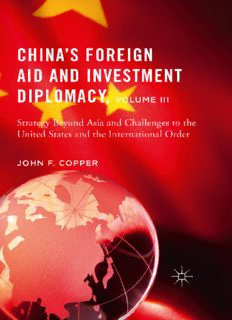
China’s Foreign Aid and Investment Diplomacy, Volume III: Strategy Beyond Asia and Challenges to the United States and the International Order PDF
Preview China’s Foreign Aid and Investment Diplomacy, Volume III: Strategy Beyond Asia and Challenges to the United States and the International Order
China’s Foreign Aid and Investment Diplomacy, Volume III China’s Foreign Aid and Investment Diplomacy, Volume III Strategy Beyond Asia and Challenges to the United States and the International Order John F. Copper CHINA’S FOREIGN AID AND INVESTMENT DIPLOMACY, VOLUME III Copyright © John F. Copper 2016 Softcover reprint of the hardcover 1st edition 2016 978-1-137-55183-2 All rights reserved. No reproduction, copy or transmission of this publication may be made without written permission. No portion of this publication may be reproduced, copied or transmitted save with written permission. In accordance with the provisions of the Copyright, Designs and Patents Act 1988, or under the terms of any licence permitting limited copying issued by the Copyright Licensing Agency, Saffron House, 6-10 Kirby Street, London EC1N 8TS. Any person who does any unauthorized act in relation to this publication may be liable to criminal prosecution and civil claims for damages. First published 2016 by PALGRAVE MACMILLAN The author has asserted their right to be identified as the author of this work in accordance with the Copyright, Designs and Patents Act 1988. Palgrave Macmillan in the UK is an imprint of Macmillan Publishers Limited, registered in England, company number 785998, of Houndmills, Basingstoke, Hampshire, RG21 6XS. Palgrave Macmillan in the US is a division of Nature America, Inc., One New York Plaza, Suite 4500, New York, NY 10004-1562. Palgrave Macmillan is the global academic imprint of the above companies and has companies and representatives throughout the world. ISBN: 978-1-349-55595-6 E-PDF ISBN: 978–1–137–53268–8 DOI: 10.1057/9781137532688 Distribution in the UK, Europe and the rest of the world is by Palgrave Macmillan®, a division of Macmillan Publishers Limited, registered in England, company number 785998, of Houndmills, Basingstoke, Hampshire RG21 6XS. Library of Congress Cataloging-in-Publication Data Names: Copper, John Franklin. Title: China’s foreign aid and investment diplomacy / John F. Copper. Description: New York City : Palgrave Macmillan, 2015– | Includes bibliographical references and index. Identifi ers: LCCN 2015020279| ISBN 9781137551818 (v. 1 : hardback) | ISBN 9781137551825 (v. 2 : hardback) (v. 3 : hardback) Subjects: LCSH: Economic assistance, Chinese—Developing countries. | Investments, Chinese—Developing countries. | BISAC: POLITICAL SCIENCE / History & Theory. | POLITICAL SCIENCE / International Relations / General. | POLITICAL SCIENCE / International Relations / Diplomacy. | POLITICAL SCIENCE / Public Policy / Economic Policy. | POLITICAL SCIENCE / Government / General. Classifi cation: LCC HC60 .C66525 2015 | DDC 33.91/5101724—dc23 LC record available at http://lccn.loc.gov/2015020279 A catalogue record for the book is available from the British Library. To my beloved son Royce Wellington Copper, to whom I entrust the future Contents Preface ix Preface to Volume III x i Chapter 1 China’s Foreign Aid and Investment Diplomacy to African Nations—I 1 Chapter 2 China’s Foreign Aid and Investment Diplomacy to African Nations—II 43 Chapter 3 China’s Foreign Aid and Investment Diplomacy in Other Regions—Europe, the Middle East, Latin America, and Oceania 91 Chapter 4 Summary and Conclusions 143 Notes 207 Selected Bibliography for Volume III 281 Index 295 Preface The People’s Republic of China began giving foreign aid as soon as its government was established in 1949. China helped finance two wars. They were the wars that had the greatest impact of any in the post–World War II period: the Korean War and the Vietnam War. China also financed wars of national liberation in a host of Third World countries. Meanwhile foreign aid helped Beijing negotiate establishing diplomatic ties with a number of developing countries and win support for important tenets of its foreign policy. To some, China became a model for aid giving: a poor country that gener- ously helped other poor countries and a country that gave assistance expedi- tiously, efficiently, and without conditions. Some observers said that China made it necessary to reexamine the meaning of the term “foreign aid.” In the 1970s and 1980s, notwithstanding impressive successes in its for- eign aid diplomacy, Chinese leaders noted that China’s aid program had experienced serious setbacks; more important, they felt China needed capital for its own economic development. China thus became a major recipient of financial aid from international lending institutions while it attracted large amounts of investment money from Western countries and from Overseas Chinese. Giving foreign assistance in this context did not make much sense and China drastically reduced its aid giving. But China’s economy soon boomed, and in the 1990s after it began to accumulate large stores of foreign exchange, Chinese leaders resurrected China’s foreign aid giving and increased it several fold calling much of it for- eign investments. Investments served many of the same purposes as aid and sounded better. In any event, China “transferred” large amounts of its newly acquired foreign exchange to poor countries. This provided succor for their development. It also expanded China’s external influence. Not by accident China’s external financial help became a major factor in its global rise.
Description: